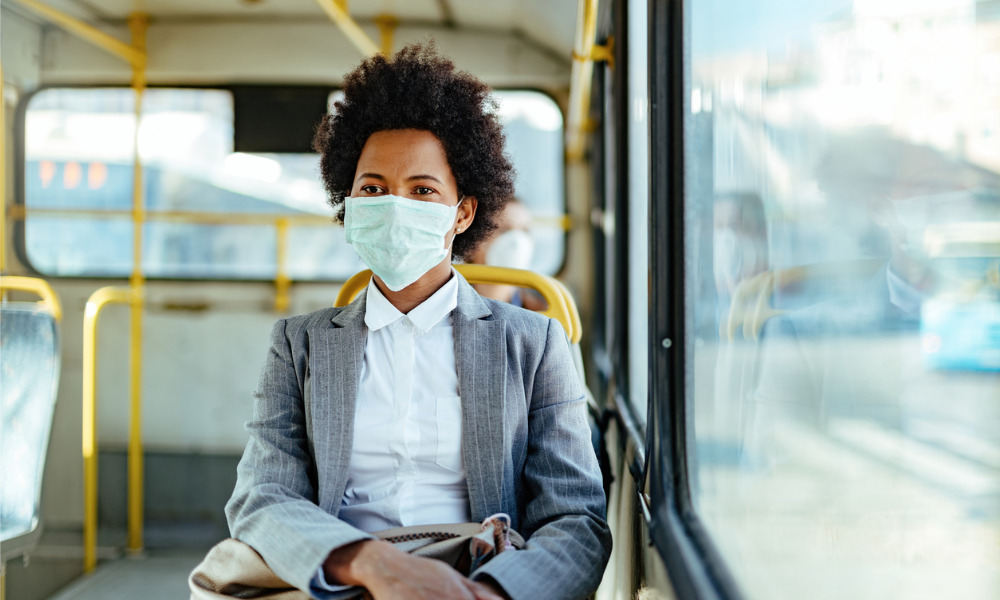Is public transit part of workplace safety? Can workers refuse business travel?

Many employees are still reticent about a return to the workplace while the pandemic continues to have an impact. And this is raising several questions for employers.
Canadian HR Reporter talked to Malini Vijaykumar, associate lawyer at Nelligan Law in Ottawa, for some legal insights when it comes to keeping employees safe.
Q: How important is the type of employer when it comes to a safe workplace?
A: “The employer’s obligation to maintain a safe workplace is very much tied to the circumstances. In fact, their duty under the health and safety legislation specifically says employers have to take all precautions that are reasonable in the circumstances to ensure employees safety and so, obviously, that includes a consideration of the type of workplace that you have.”
“Maybe in a grocery store, reasonable precautions for safety involves things like plastic barriers for cashiers, limiting cash transactions, requiring customers to use the pin pad machine with a Q-tip instead of their fingers. Whereas for construction sites, building contractors and the like, maybe you have to focus more on trying to socially distance your crews; maybe running crews with less people so that there’s more space between them on the worksite and providing personal protective equipment and obviously in the office environment, it’s different still.”
Q: What is the definition of ‘reasonable precautions’?
A: “It is definitely going to depend on the workplace. We know that the federal government has released some guidance on potential options for safety precautions that could be generally applicable: posting signs, encouraging social distancing, encouraging proper hand hygiene, providing hand sanitizer, maybe increasing the cleaning schedule, especially for an office-type setting, or grocery store, food-prep type environment.
“If it is an office setting where employees can work from home then, of course, continuing to offer that as an option and maybe limiting capacity of how many workers can be in the office at a given time, in order to encourage social distancing. Those are probably some of the common things that we can start to see.”
Q: What if an employer isn’t doing temperature testing or requiring masks, could a worker say that’s not a safe workplace?
A: “It really depends on the workplace itself; it really is context-specific.
“Temperature testing is not something we’ve seen a lot of coming up here in Canada and Ontario. But if you work in food prep and your employer does not provide you a mask, or you work in fast food and you have to interact with customers who are standing two feet across from you over the counter and your employer does not provide you a mask, well that’s a very different kind of situation and arguably closer to breaching their duty under health and safety legislation to make the workplace safe for you than if you work in an office and you can keep a distance of six feet from your colleagues and you don’t have people up in your face all day.
“In that situation, maybe your employer doesn’t really need to provide you with a mask but can still meet their duty under health and safety legislation to make the workplace reasonably safe.”

Malini Vijaykumar
Q: Can a workplace be considered unsafe if employees aren’t disciplined for not following the safety guidelines?
A: “If you have an employee who persistently believes the pandemic is a hoax and keeps getting right up in people’s faces, the Health and Safety Act doesn’t lay out specific, minutely detailed rules [for that]. But, just as reasonable precautions, let’s say I have a colleague who will not respect social distancing but will insist on handshakes every time they see me, and I report this to management and management doesn’t do anything about it, then yes, that could be a breach of the employer’s duty to take reasonable safety precautions.
“The employer should be managing the performance of that employee because this is a performance issue in terms of how they relate to each other in the workplace and in terms of how they don’t help to keep a safe workplace environment.”
Q: Can public transit be considered part of an unsafe workplace?
A: “That’s one of these really interesting hot-button issues in all of this, it’s changing so fast, and we don’t yet have much guidance from the courts and tribunals on this… [it’s an] educated guess and it’s really going to depend on the situation.
“I’m not sure that a general fear of contracting COVID-19 from being on public transit would be sufficient to justify a work refusal. Unless maybe if the employee has a job where they can work from home very easily and the employer, for no reason, is making everybody come into the office when they really don’t need to be doing so, that employer is going to have a much harder time justifying their actions in making everybody come in.
“Then let’s say an employee who works in retail or food service where that job really cannot be done from home. And the employer does need them to come in. In that case, an employer who takes reasonable safety precautions, provides personal protective equipment, requires social distancing and has these procedures in place, is likely going to have a stronger position to a general desire not to use public transit: ‘I’m sorry that’s not a reasonable unsafe work refusal.’
“The situation also might change based on the employee circumstances: If the employee is part of a high-risk population or is immunocompromised, then even if their workplace would normally require them to be in-person, maybe they really should be trying to give that person some sort of duty that they can perform from home -- maybe sorting through paperwork or billing or something.
“If an employee themselves is immunocompromised or has a legal duty to care for a family member who is immunocompromised, then in that case we’re getting into human rights territory and an employer could be liable if they fail to reasonably accommodate that person up to the point of undue hardship.
“Some provinces and jurisdictions have also instituted job-protected leaves for employees who are immunocompromised or who need to self-isolate because they’re caring for someone who’s immunocompromised. For example, in Ontario, the ESA [Employment Standards Act] was amended to provide this type of job-protected leave and if an employee is immunocompromised, and they’re being threatened with termination because they can’t come in, they may have recourse not only under human rights legislation, but also under these new provisions of employment standards legislation as well.”
Q: Can an employer force an employee to do business travel?
A: “As a starting point, employers are going to have a hard time justifying directives for business travel that are not in line with the latest public health guidance. If public health has issued directives to limit all non-essential international air travel, for example, and an employer is trying to order an employee to go on non-essential international air travel and the employee then says no, and the employer tries to discipline the employee for that refusal, the employer would have a hard time justifying such discipline.
“We’re looking at a similar situation to the public transit [question]: Is this really required? Is there any accommodation that can be made? Does the employee have a disability? Or are they at high risk? Or do they have some kind of family status requirement or care need? All of those things are going to have to be considered.”
Amid the pandemic, Canadian HR Reporter has also talked to legal experts on the legal questions surrounding remote workers and vacation considerations for employers.
And in Ontario, stats show that only one unsafe work refusal has been upheld, despite there being almost 300 such requests.




